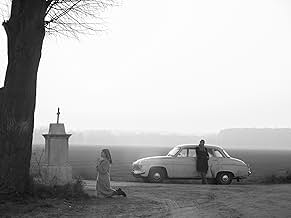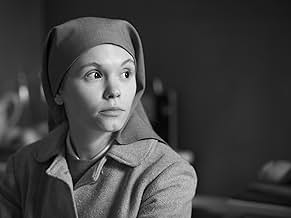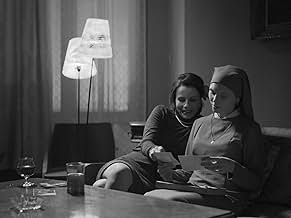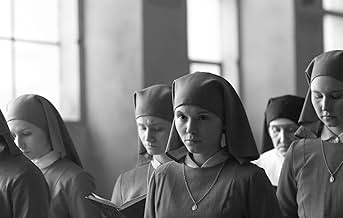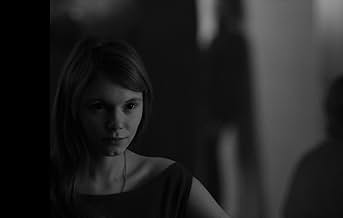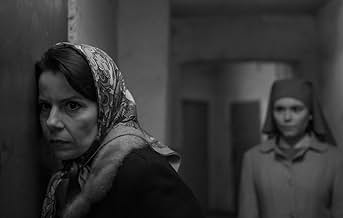A novice nun about to take her vows uncovers a family secret dating back to the German occupation.A novice nun about to take her vows uncovers a family secret dating back to the German occupation.A novice nun about to take her vows uncovers a family secret dating back to the German occupation.
- Director
- Writers
- Stars
- Won 1 Oscar
- 70 wins & 92 nominations total
Natalia Lange
- Bronia
- (as Natalia Lagiewczyk)
Jan Wojciech Poradowski
- Father Andrew
- (as Jan Wociech Poradowski)
- Director
- Writers
- All cast & crew
- Production, box office & more at IMDbPro
Featured reviews
In the 60's Poland, a few days before pronouncing her vows of poverty, chastity and obedience to end her probation period and officially become a nun, Anna, an orphaned young woman, learns by chance the existence of her aunt, Wanda. The Mother Superior propose to Anna to meet Wanda. In this respect, she offers her to take all the necessary time. This encounter will turn her life upside down, via a journey of self-discovery and a road trip through rural Poland, in search of lost time. Lost forever...
Shot in gorgeous black and white, this film is a disconcerting beauty while remaining simple and pure, with a neat photography, elegant and appropriate framings highlighting the emptiness and the sadness of certain existences, and a careful treatment of natural light. Then, the two main actresses, Agata Kulesza and Agata Trzebuchowska, are prodigious and complement each other wonderfully. Finally, the script is excellently and soberly written, and, even if the film is hard and deals with an unpleasant subject, the staging is simple and anything but egghead. As a synthesis, the film is a masterpiece.
Shot in gorgeous black and white, this film is a disconcerting beauty while remaining simple and pure, with a neat photography, elegant and appropriate framings highlighting the emptiness and the sadness of certain existences, and a careful treatment of natural light. Then, the two main actresses, Agata Kulesza and Agata Trzebuchowska, are prodigious and complement each other wonderfully. Finally, the script is excellently and soberly written, and, even if the film is hard and deals with an unpleasant subject, the staging is simple and anything but egghead. As a synthesis, the film is a masterpiece.
Ida is the small and simple story of a complex and terrible past that gets unearthed when a nun discovers she is Jewish. Before taking her vows, she is sent out to meet her aunt, a bitter woman who drinks too much from the life and miserable aftermath of a Nazi occupied Poland. They journey in search of Ida's murdered parents and their resting place and what unfolds is simple, raw storytelling and plotting that is never overly grim, overly dramatic or hits a false note. Beautifully shot in black and white and with a short 80 minute running time that doesn't allow a moment of fat in this narrative, Ida is a rewarding experience.
This film is recommended.
Anna grew up in a Catholic orphanage, never knowing her parents. Deeply religious, she is slated to become a nun within a few weeks. However, before taking her vows, Anna must leave the convent and visit her only living relative, a cold and distant aunt. Upon their first meeting, she is told that she is really Ida, a Jewish niece. So begins their relationship and journey to find her past and specifically, her parent's unmarked graves.
With an unusually short film length of less than 90 minutes, Ida is an extremely well made film, sensitively directed by Pawel Pawlikowski. Under the backdrop of 1960's Poland, the film's premise of presenting contrasting religions and lifestyles is its main attraction. The screenplay by the director and Rebecca Lenkiewicz has much to say and tells its linear narrative concisely and without any flourish.  Ida is a fine film that could have been a great film had its script added more dimension to its central character. Anna, or Ida, is mainly a saintly conduit, a devout presence who never seems to be real in any sense. She begins as an enigma and, surprisingly, rarely displays any strong emotional reaction when confronted with disturbing news.
Agata Trzebuchowska plays Ida / Anna and she is physically right for the role. The actress invests the right degree of innocence and vulnerability. Even more effective is Agata Kulesza as Ida's bitter and alcoholic Aunt Wanda. Her role has far more depth and the actress makes subtle choices in underplaying the anger and hostility within her complex character. It is a strong and memorable performance.
The film, beautifully photographed by Ryszard Lenczewski and Lukasz Zal, might have a smaller budget than most movies these days, but one never notices any lapse in quality as production values are of the highest caliber. With lovely black & white images and a lyrical score by Kristian Eidnes Andersen, Ida is superior filmmaking, even if some of the transitions and editing seems slightly abrupt. The film effectively deals with powerful themes that will resonate with any serious film-goer and deserves to be seen. GRADE: B
Visit my blog at: www.dearmoviegoer.com
ANY COMMENTS: Please contact me at: jadepietro@rcn.com
Anna grew up in a Catholic orphanage, never knowing her parents. Deeply religious, she is slated to become a nun within a few weeks. However, before taking her vows, Anna must leave the convent and visit her only living relative, a cold and distant aunt. Upon their first meeting, she is told that she is really Ida, a Jewish niece. So begins their relationship and journey to find her past and specifically, her parent's unmarked graves.
With an unusually short film length of less than 90 minutes, Ida is an extremely well made film, sensitively directed by Pawel Pawlikowski. Under the backdrop of 1960's Poland, the film's premise of presenting contrasting religions and lifestyles is its main attraction. The screenplay by the director and Rebecca Lenkiewicz has much to say and tells its linear narrative concisely and without any flourish.  Ida is a fine film that could have been a great film had its script added more dimension to its central character. Anna, or Ida, is mainly a saintly conduit, a devout presence who never seems to be real in any sense. She begins as an enigma and, surprisingly, rarely displays any strong emotional reaction when confronted with disturbing news.
Agata Trzebuchowska plays Ida / Anna and she is physically right for the role. The actress invests the right degree of innocence and vulnerability. Even more effective is Agata Kulesza as Ida's bitter and alcoholic Aunt Wanda. Her role has far more depth and the actress makes subtle choices in underplaying the anger and hostility within her complex character. It is a strong and memorable performance.
The film, beautifully photographed by Ryszard Lenczewski and Lukasz Zal, might have a smaller budget than most movies these days, but one never notices any lapse in quality as production values are of the highest caliber. With lovely black & white images and a lyrical score by Kristian Eidnes Andersen, Ida is superior filmmaking, even if some of the transitions and editing seems slightly abrupt. The film effectively deals with powerful themes that will resonate with any serious film-goer and deserves to be seen. GRADE: B
Visit my blog at: www.dearmoviegoer.com
ANY COMMENTS: Please contact me at: jadepietro@rcn.com
10Red-125
Ida (2013) is a Polish film co-written and directed by Pawel Pawlikowski. This brilliant film follows a few days in the life of Anna, a young novitiate nun. Anna has been raised in a convent, and she plans to take her vows and stay in the convent for the rest of her life.
However, before this can take place, the mother superior sends her to meet her only living relative, a woman named Wanda.
The pair could not be less similar. Ida is quiet, gentle, thoughtful, and shy. Her aunt is tough as nails--she has real power as a judge, and she knows how to use it. She's a heavy drinker and a heavy smoker. She's also a Jew.
In the first few minutes of the movie, Anna learns that she's Jewish. As a very young girl, she was taken to the convent, where the nuns raised her. (Her real name is Ida, which is why that's the title of the film.)
Wanda and Anna set out to return to their rural home, to solve the mystery of what happened to their family 20 years earlier. Why did Ida survive, when her family--other than Wanda--did not?
This film, shot in black & white, is superbly constructed on every dimension. The plot is tight, and the acting is incredible. Agata Kulesza (Wanda) and Agata Trzebuchowska (Anna/Ida), are immensely talented actors.
The cinematography is incomparable. My wife and I felt as if any frame--from the beginning to the end of the movie--would make a great still photograph.
Pawlikowski knows how to focus on his main actors, but he also lets us know that, while the protagonists are involved in heartbreaking drama, the rest of the world is going about its business around them.
This is a grim film. Anna's life is restricted by her piety. Wanda's life is constricted by alcohol and--it would appear--by lack of any close personal relationships. Everyone in Poland is restricted by horrible memories, dark secrets, and Soviet domination.
Grim or not, this is a film you shouldn't pass up if you care about great cinema. We saw it on a large screen at the LittleTheatre in Rochester, NY. However, it will work well enough on DVD. Don't miss it.
However, before this can take place, the mother superior sends her to meet her only living relative, a woman named Wanda.
The pair could not be less similar. Ida is quiet, gentle, thoughtful, and shy. Her aunt is tough as nails--she has real power as a judge, and she knows how to use it. She's a heavy drinker and a heavy smoker. She's also a Jew.
In the first few minutes of the movie, Anna learns that she's Jewish. As a very young girl, she was taken to the convent, where the nuns raised her. (Her real name is Ida, which is why that's the title of the film.)
Wanda and Anna set out to return to their rural home, to solve the mystery of what happened to their family 20 years earlier. Why did Ida survive, when her family--other than Wanda--did not?
This film, shot in black & white, is superbly constructed on every dimension. The plot is tight, and the acting is incredible. Agata Kulesza (Wanda) and Agata Trzebuchowska (Anna/Ida), are immensely talented actors.
The cinematography is incomparable. My wife and I felt as if any frame--from the beginning to the end of the movie--would make a great still photograph.
Pawlikowski knows how to focus on his main actors, but he also lets us know that, while the protagonists are involved in heartbreaking drama, the rest of the world is going about its business around them.
This is a grim film. Anna's life is restricted by her piety. Wanda's life is constricted by alcohol and--it would appear--by lack of any close personal relationships. Everyone in Poland is restricted by horrible memories, dark secrets, and Soviet domination.
Grim or not, this is a film you shouldn't pass up if you care about great cinema. We saw it on a large screen at the LittleTheatre in Rochester, NY. However, it will work well enough on DVD. Don't miss it.
Ida was a dark somber tragic story expressed perfectly in film.
I am not a big fan of black and white "art" movies done for effect, except the old black and white movies, but Ida was filmed so perfectly, and the stark black and white was so integral to the story and feeling of the movie it was really perfect.
I am not a big fan of jazz either, but again, the choice of Coltrane's jazz music for parts of this film really let you feel what jazz is all about, it was beautiful.
The story was of an orphan nun who is preparing to take her final vows to God. The Mother Superior calls her in and tells her about who she is. Ida grew up not knowing her name or anything about her family. Ida finds that she has an aunt nearby and is told to go to see her before taking her vows.
The slow, heavy and deliberate pace of the movie express the story so perfectly, and there is no pandering or cheap shots, the movie is beautifully done. This is a story that is not for everyone, or every time, but I am glad it was made and that I saw it.
I have to give it a 10/10 for pure craftsmanship and cinematic perfection.
I am not a big fan of black and white "art" movies done for effect, except the old black and white movies, but Ida was filmed so perfectly, and the stark black and white was so integral to the story and feeling of the movie it was really perfect.
I am not a big fan of jazz either, but again, the choice of Coltrane's jazz music for parts of this film really let you feel what jazz is all about, it was beautiful.
The story was of an orphan nun who is preparing to take her final vows to God. The Mother Superior calls her in and tells her about who she is. Ida grew up not knowing her name or anything about her family. Ida finds that she has an aunt nearby and is told to go to see her before taking her vows.
The slow, heavy and deliberate pace of the movie express the story so perfectly, and there is no pandering or cheap shots, the movie is beautifully done. This is a story that is not for everyone, or every time, but I am glad it was made and that I saw it.
I have to give it a 10/10 for pure craftsmanship and cinematic perfection.
Did you know
- TriviaPawel Pawlikowski had such difficulty finding an actress to play the titular character that he asked his friends to take secret photographs if they saw anyone who was in the right ballpark of the character. One of his friends, director Malgorzata Szumowska, saw Agata Trzebuchowska in a Warsaw café, took the picture and persuaded her to audition. She agreed to meet with Pawlikowski because she was a fan of his film My Summer of Love (2004).
- GoofsWhen Ida is in a church, the priest seems to be getting ready to say Mass and we see a versus populum altar, which didn't become the norm until years later after Vatican II. The movie takes place in 1961 and the priest would have been saying Mass on the high altar.
- ConnectionsFeatured in 72nd Golden Globe Awards (2015)
- SoundtracksSerduszko puka w rytmie cha-cha
Music by Romuald Zylinski
Lyrics by Janusz Odrowaz-Wisniewski
Performed by Maria Koterbska
- How long is Ida?Powered by Alexa
Details
- Release date
- Countries of origin
- Official sites
- Languages
- Also known as
- Іда
- Filming locations
- Production companies
- See more company credits at IMDbPro
Box office
- Budget
- $1,000,000 (estimated)
- Gross US & Canada
- $3,827,060
- Opening weekend US & Canada
- $55,438
- May 4, 2014
- Gross worldwide
- $11,156,836
- Runtime1 hour 22 minutes
- Color
- Sound mix
- Aspect ratio
- 1.37 : 1
Contribute to this page
Suggest an edit or add missing content




